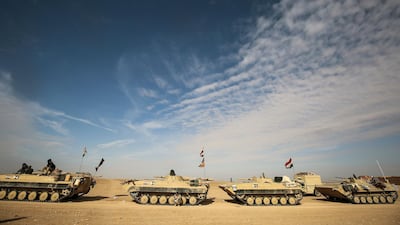By the middle of November 2007, United States troops in Iraq had passed a bloody landmark: that year had officially become the worst year for American soldier deaths since the 2003 invasion.
Nearly 1,000 soldiers had lost their lives, more than in 2004, which had been the most bloody.
The same was true of Iraqi civilians. What was now a full-fledged civil war was spiralling out of control.
More large-scale bombings took place in 2007 than ever before, most of them aimed not, as in the early years of the war, at the western coalition but at the Sunni and Shiite communities. Nearly 30,000 civilians, according to one count, lost their lives.
A decade on and Iraq looks rather different. Coalition troop deaths are down to double digits, although Iraqi civilians are still dying in their thousands (at least 10,000 so far this year).
The difference is that the cause is no longer an intra-Iraqi conflict but the war against ISIL.
The war against ISIL has led to surprising changes in Iraqi society. It might yet precipitate a greater re-ordering of how Iraqi communities interact with each other. Stated broadly, the war against ISIL has led to greater trust between Sunni and Shiite communities and a commensurate rise in the idea of an Iraqi, rather than purely sectarian, identity.
The shift has been one of tone. In the run-up to the attack on Mosul, Iraqi prime minister Haider Al Abadi spoke in nationalist terms about reclaiming the city.
The Hashed Al Shaabi, or Popular Mobilisation Forces, the Shiite-dominated paramilitary groups that have proven to be tough fighters, were long seen – and behaved – as the paramilitary group of the Shiite community. But in the fight against ISIL, that changed significantly.
_________________
Read more from Opinion
Are airlines' class systems turning into caste systems?
Some thought the terrorists were after Egypt's Christians. Turns out, they are after everyone
Zimbabwe's regime change is a reset of where power lies
_________________
Early last year, Mr Al Abadi approved the addition of tens of thousands of Sunni fighters to the PMF, something that had not previously happened on that scale. At the end of last year, Iraq’s parliament passed a law bringing the PMF formally into the Iraqi armed forces.
Such a change would have been extremely unlikely under the previous prime minister Nouri Al Maliki. Unlike Mr Al Abadi, Mr Al Maliki was seen as a Shiite, rather than nationalist, leader.
Having the PMF under his control as commander in chief, with the paramilitaries paid government money, would have seemed incredibly provocative. But in 2016, although there was dissent, it was muted; there appeared to be a willingness among Sunni parliamentarians to give Mr Al Abadi the benefit of the doubt.
That shift has also been replicated among Sunni communities in the country.
One suggestion has been that Iraqis, of whatever background, believed the army and the Shiite militias (mainly the PMF) deserved the credit for liberating parts of Iraq from ISIL – and, crucially, that support for the PMF was maintained in traditionally Sunni areas in the west of Iraq.
Research also found that fear of the PMF committing further acts of violence against civilians had dropped among Sunnis.
Although it was still at more than 50 per cent, it was a rather remarkable shift, given the longstanding accusations against the PMF of revenge killings of Sunni civilians.
A significant shift in public support for the Shiite militias should not be underestimated.
It heralds a potentially greater shift in acceptance that the instruments of Shiite power, previously used only to support the Shiites communities, are now gaining acceptance among Sunnis as instruments to protect them as well.
The sectarian aspect hasn’t gone away, of course. But the perception of it has lessened and a deeper reality of political debate and divides has become clearer.
Sunnis now want to influence the PMF from within, rather than fight it.
Debating the research in London’s Chatham House over the summer, Renad Mansour, an academy fellow at the institute, made this very point: “At the beginning there was a fear that the PMF were the Shiite militia backed by Iran,” he said. “But what you’re seeing is that the Shiite block is not a monolith. If you take off that sectarian lens to analyse Iraq, you actually see contestations (within the Shiite groups).”
This brief, positive window has come about because of the war against ISIL. So brutal was the rule of ISIL in Mosul and the territories it held that it became a rallying point for all sections of the population.
The Iraqi army, previously seen to favour one community over another, is now seen more as a guarantor of stability. As in other countries, disparate communities that are in tension with each other can rally around the army as the stabilising force.
How long this brief window lasts remains to be seen. It all depends on the politics. The defeat of ISIL has opened up a window of possibility, one that hasn’t existed for a decade. Yet there are still significant challenges.
Hundreds of thousands of Iraqis remain displaced internally and externally. Cities and towns and communities need to be rebuilt, with public money. Sunnis need to be given a genuine stake in all branches of the government and the army.
None of this can be done overnight.
The dark days of 2007 are past, but they are not yet history. Coming through the fires of ISIL has given Iraq’s communities the possibility of reconciliation. It is now up to Baghdad to seize it.


